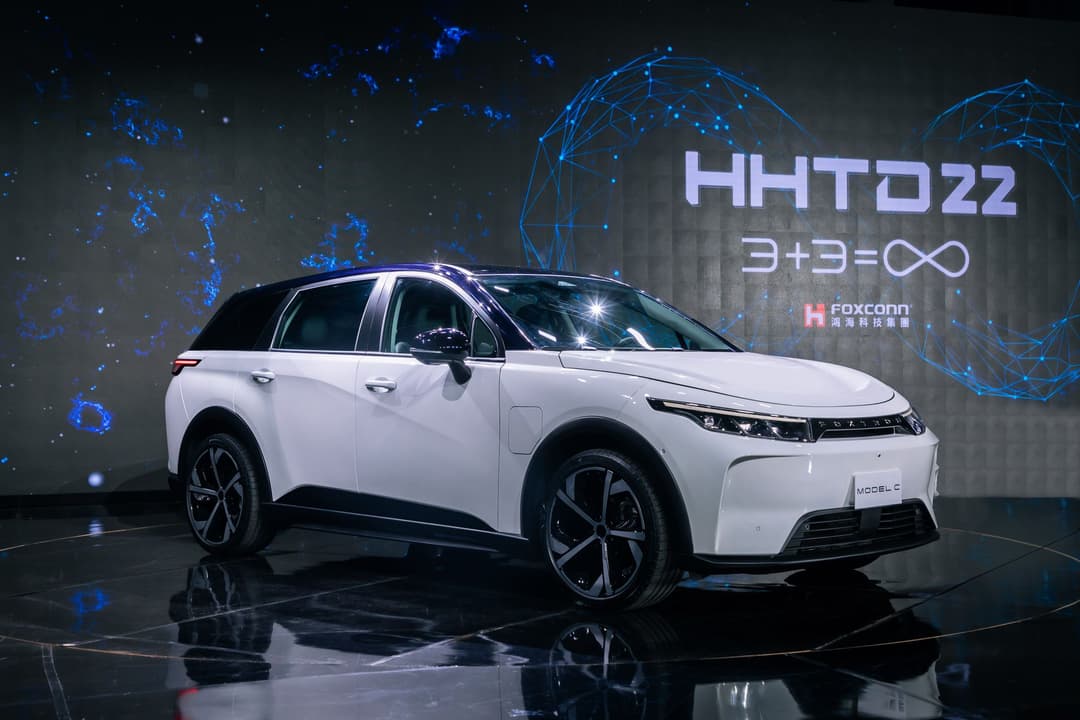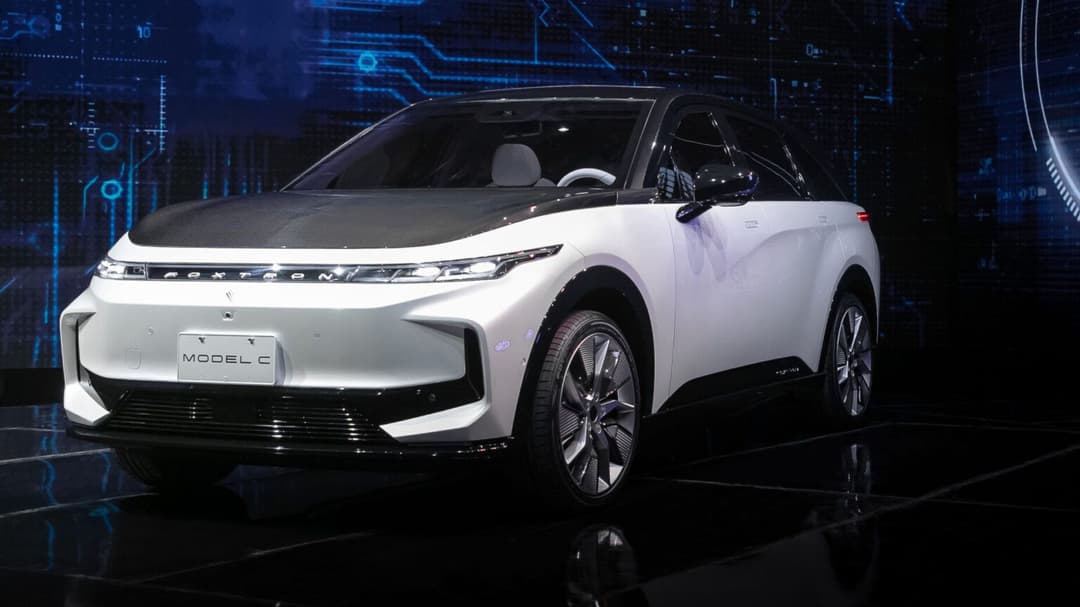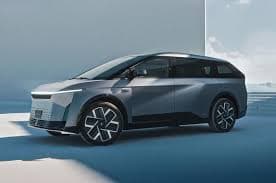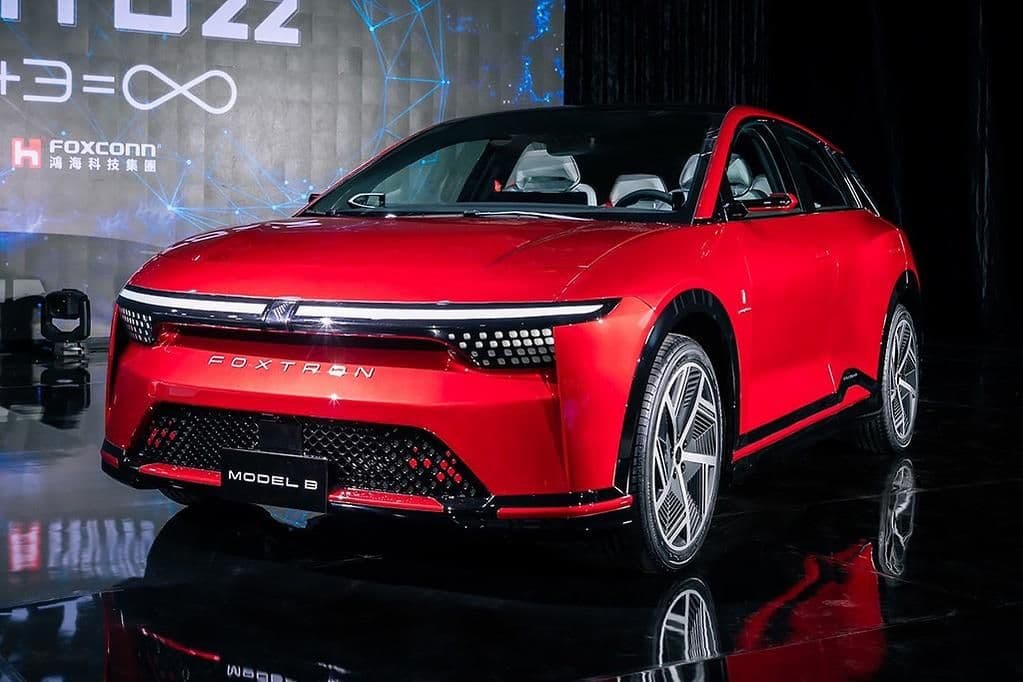In a partnership no one saw coming a few years ago, the company best known for assembling your iPhone is about to help Mitsubishi launch an electric SUV in Australia. Foxconn, the Taiwanese tech manufacturing giant for iPhone has reportedly signed a deal with Mitsubishi to deliver an all-new battery-powered compact SUV to Australian and New Zealand dealerships by the first half of 2026.
This isn’t just another hyped concept car, its real. The EV in question, known as the Model B, was first revealed in 2022 under Foxconn’s EV brand, Foxtron, and is already moving closer to production. It’s a compact, high-riding electric hatch, measuring 4.32 metres in length, with sleek exterior styling designed by none other than Pininfarina.
▶️MORE: Electric Car Sales Fall, PHEV Sales Skyrocket

Big Tech Meets Aussie Roads
At a press conference in Tokyo on April 9, Foxconn executive Jun Seki made it clear that the company is ready to scale EV production globally. While he didn’t name Mitsubishi outright, multiple Japanese media outlets did and Mitsubishi Australia, hasn’t denied it either.
If this deal goes ahead as reported, Mitsubishi’s Australian arm may finally get a modern EV offering, and at just the right time. Its current EV oferings only include plug-in-hybrids including the Eclipse and Outlander.
Its most popular vehicle, the petrol ASX has been on sale for more than 15 years. An electric replacement based on the Model B would not only refresh the lineup but also help Mitsubishi earn much-needed NVES CO₂ credits under Australia’s upcoming emissions standards.
▶️MORE: 5 Cheapest Electric Cars in Australia (2025)

What We Know About the Model B
The Model B is expected to offer both single and dual-motor powertrains, backed by a 60kWh battery with a range of up to 500km (likely based on the NEDC cycle). While we haven’t seen Australian specs just yet, the numbers suggest it could compete with popular compact EVs like the Hyundai Kona Electric and MG4.
This won't be your ordinary Mitsubishi car however, this EV comes with tech DNA straight from the world of high-volume electronics manufacturing. Foxconn claims its vehicles will benefit from low-cost, high-quality production and cutting-edge tech, thanks to its experience building everything from smartphones to servers.
▶️MORE: Bidirectional (V2H and V2G) EV Chargers Guide (2025)
Foxconn’s Bigger EV Push
This isn’t a one-off project. Foxconn, officially known as Hon Hai Technology Group, is going all-in on EVs, with at least six battery-powered vehicles in its production pipeline. The Model B is just the beginning. Other models include:
- Model C: A mid-size SUV (already on sale as the Luxgen N7 in Taiwan), arriving in the US by late 2025
- Model D: A people mover
- Model E: A mid-size SUV-coupe
- Model A: A small cargo van
- Model T: A full-size bus
- Model U: A minibus
▶️MORE: When is V2G Really Coming to Australia?

Notably missing? The Model V dual-cab ute, which debuted alongside the Model B back in 2022 but hasn’t been mentioned since.
All of these EVs are expected to be built on the same modular architecture, allowing Foxconn to keep costs down and components shared across the lineup.
Model C: A Preview of What’s Coming?
If the Model B follows the tech specs of the Model C, Australian EV buyers are in for a treat. The Model C offers a choice between a 58kWh battery with 500km of range, and a beefier 83kWh pack good for up to 700km, figures that stack up well even against Tesla’s Model Y.
Power-wise, the RWD variant gets a 172kW motor with 340Nm of torque, while the AWD flagship delivers a whopping 344kW and 680Nm, launching from 0–100km/h in just 3.8 seconds. It even features active air suspension, not something you usually find in affordable EVs.
If Mitsubishi taps into this performance for the Model B, it could shake up the compact SUV segment in Australia.
▶️MORE: Which Electric Cars Have Bidirectional Charging (V2L, V2G, V2H)

A New Way to Build Cars
Foxconn’s strategy isn’t to become a consumer car brand. Instead, it’s positioning itself as the contract manufacturer of the EV world. like a Taiwanese Magna Steyr. It wants to build cars for automakers, not compete with them.
This B2B approach makes sense. Car companies like Mitsubishi (and potentially Nissan or Honda, as rumours suggest) get a fast-tracked way into the EV space without shouldering massive R&D costs. And Foxconn gets the production volume it needs to make its new car division viable.
Of course, Foxconn’s journey into EVs hasn’t been without hiccups. Its previous partnership with Lordstown Motors in the US ended in bankruptcy. But with vehicles now being sold under the Luxgen badge in Taiwan, and solid backing for global expansion, the tech giant seems more prepared than ever.
▶️MORE: Australian Roadmap for Bidirectional EV Charging Released
Why This Matters for Aussie EV Fans
If you’re a prospective EV buyer in Australia, this is big news. For starters, Mitsubishi hasn’t had a fresh, fully electric model in years. A compact SUV built by Foxconn could finally bring the brand into the modern EV age.
Second, this move could signal the beginning of a major shift in how EVs are developed and delivered. Tech companies partnering with automakers to build smarter, cheaper, more efficient vehicles, without starting from scratch.
The Model B may not wear a Foxconn badge when it arrives in Australia, but make no mistake: your next EV could have been built by the same company that made your smartphone.
Stay up to date with the latest EV news
- Get the latest news and update
- New EV model releases
- Get money savings-deal
